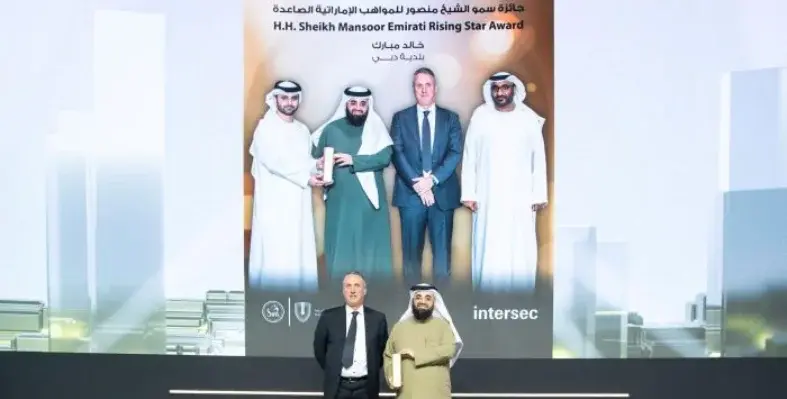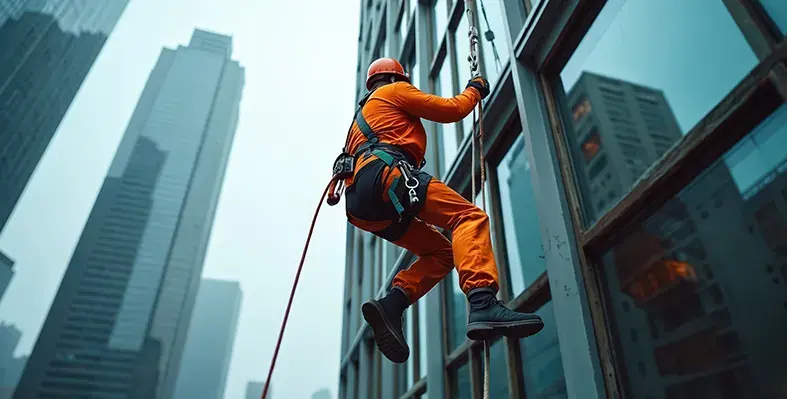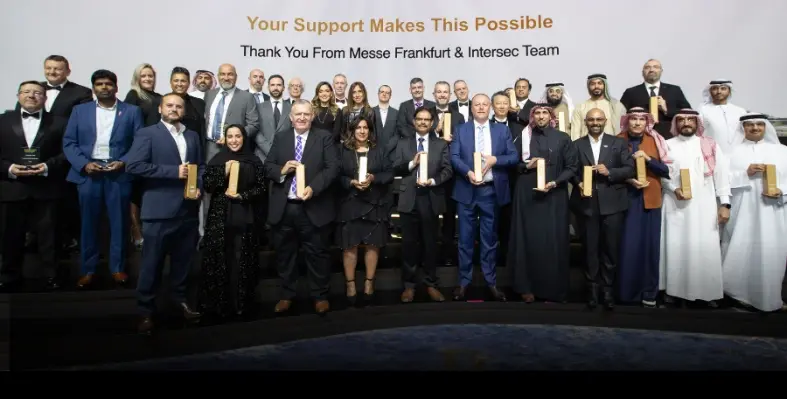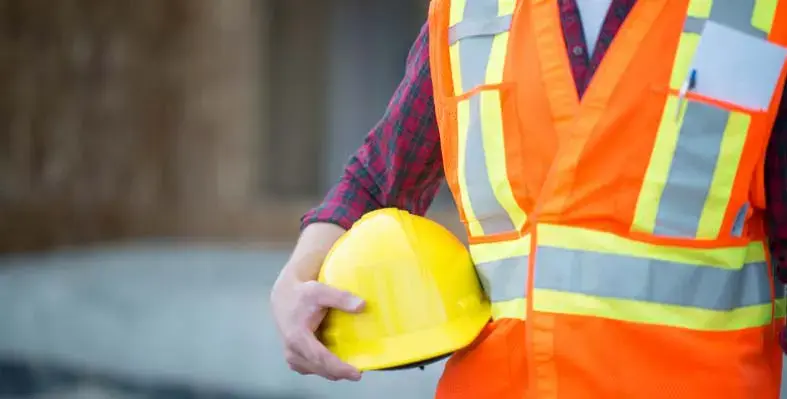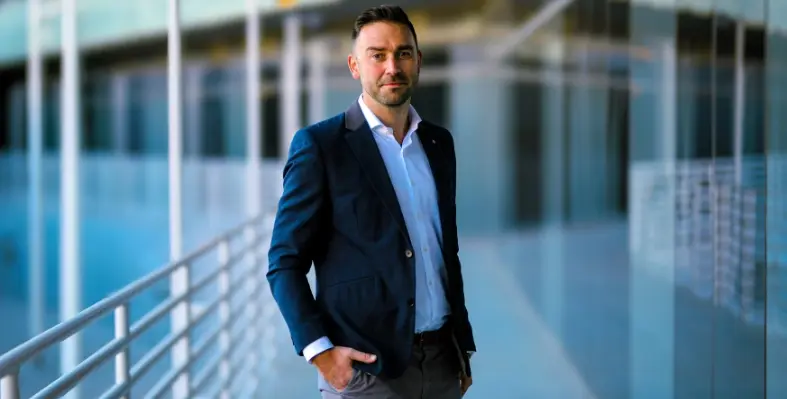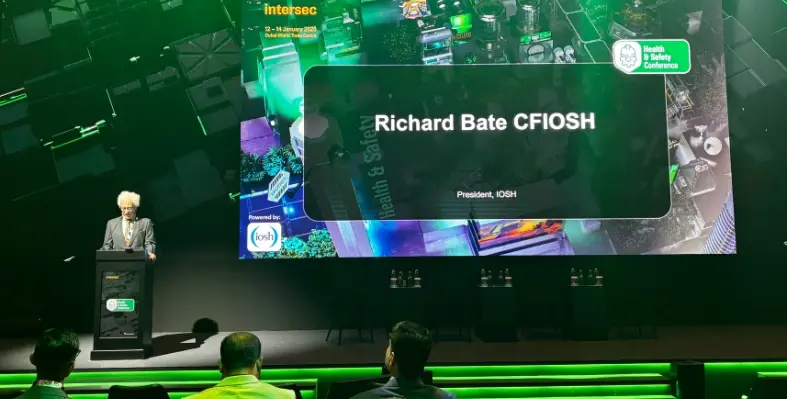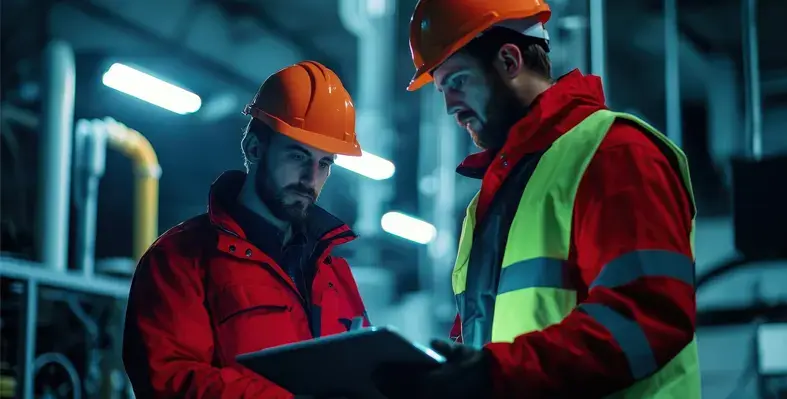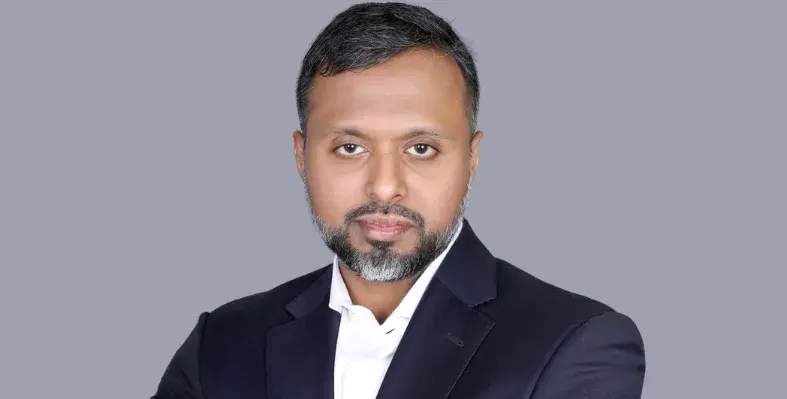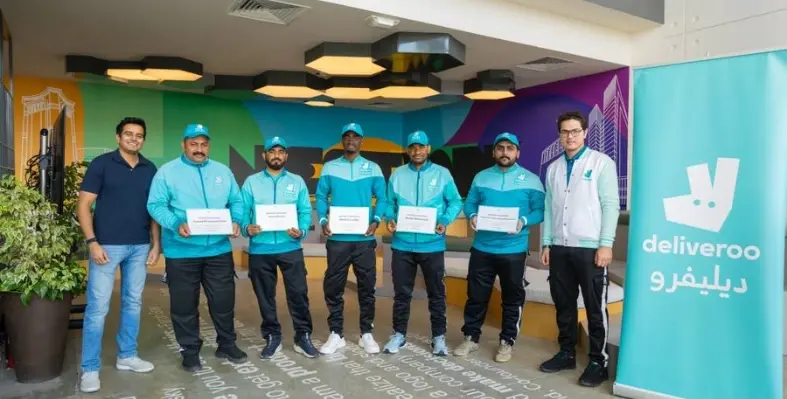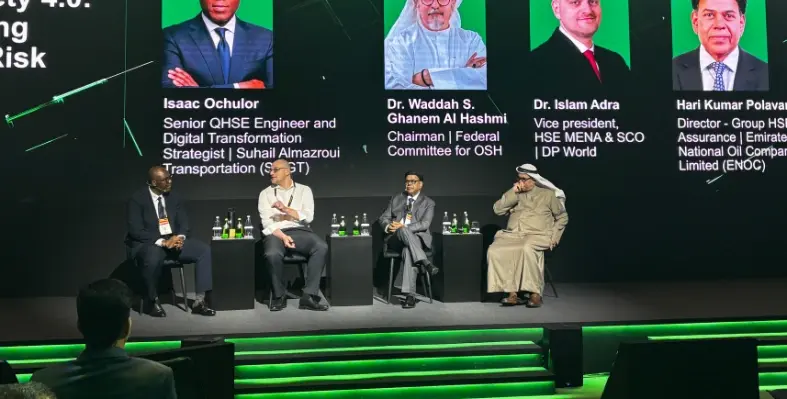Industrial Insights
Industrial Insights
- Details
- Matthew Hayhoe
- Industrial Insights
- Topic: HSE
- Region: Middle East
- Year: 2026
Khalid Mubarak of Dubai Municipality has received the H.H. Sheikh Mansoor bin Mohammed bin Rashid Al Maktoum Emirati Rising Star Award at the Intersec Awards 2026, recognising his growing contribution to strengthening safety, security, and regulatory standards in the UAE. Albadr Jannah of Saudi Aramco was named Industry Leader of the Year, acknowledging sustained leadership and influence across safety, security, and organisational resilience at regional and global levels
Now in their fifth edition, the Intersec Awards recognise excellence across 17 categories spanning fire safety, occupational health and safety, security, and industry leadership. The 2026 winners were announced at a gala dinner held at the Conrad Dubai, following a rigorous evaluation process conducted by an independent panel of 23 international judges.
Individual honours also included Jazyah Aldossary of Saudi Aramco, who received the Women Trailblazers in Security, Fire Safety and HSE Award for her leadership in advancing safety culture and professional standards. Moataz Allami of Humain was named CISO of the Year, recognising excellence in cybersecurity governance and organisational resilience.
In the team and consultancy categories, WSP received the Best HSE Team Award for consistent performance and effective risk management across complex projects, and was also recognised for Strategy in Consultancy for its advisory work in fire safety, security, and resilience. WE ONE Security was awarded Best Security Team for operational excellence and service delivery.
Fire and safety innovation was a key focus, with Kentec Electronics and Hochiki Middle East jointly recognised in the Best Active Fire Safety Product category for advanced detection technologies enhancing early warning and false alarm reduction. CI Global received the Best Passive Fire Safety Product Award for CI Safe, strengthening life safety through compliant passive fire protection.
Axis Communications was awarded Best Safety Protection Solution for the AXIS D6210 Air Quality Sensor, reflecting the growing integration of environmental monitoring into safety strategies. WSP Middle East won Best Fire Safety Project – MEA for One Za’abeel, cited for excellence in fire engineering, integrated design, and regulatory coordination.
In the Impact Makers category, Saudi Aramco was recognised for From Code to Clarity to Compliance, translating regulatory requirements into practical, enterprise-wide safety systems. The Incident Resolution Spotlight Award went to the General Command of Dubai Civil Defence for its Drone Firefighting Unit, highlighting innovation in emergency response and firefighter safety.
Security awards recognised solutions strengthening public safety and critical infrastructure protection. Dubai Police received Best Security Project – MEA for its blockchain-enabled Lost Passport Certificate initiative, while SWS Inntech Sdn. Bhd. and ONES Technology were recognised for homeland security solutions supporting secure weapons management and biometric identity verification. Additional awards covered commercial security, perimeter protection, and cybersecurity innovation.
- Details
- Louise Waters
- Industrial Insights
- Topic: HSE
- Date: 22nd January 2026
- Year: 2026
Workplace safety remains a central concern for organisations operating in industrial and high risk environments
Construction sites, manufacturing plants, warehouses, and service facilities all face daily hazards that can affect workers and operations. Strong safety practices help reduce injuries, limit disruptions, and support a culture of accountability. Training plays an important role in preparing teams to recognize risks and follow established procedures.
Health and safety professionals, managers, and frontline workers all share responsibility for maintaining safe workplaces. Regulations continue to evolve, and organisations must stay informed to meet compliance expectations. Clear guidance helps teams understand how rules apply to daily tasks and why consistent safety behaviour matters. Education supports both prevention and confidence across the workforce.
Structured learning through OSHA safety training gives organisations a practical way to address these needs. Access to industry focused courses such as those available at helps workers understand safety requirements that apply to their roles. Training aligned with standards set by Occupational Safety and Health Administration supports safer operations and consistent compliance across industries.
Why OSHA standards matter across industries
OSHA standards were developed to address common hazards found in workplaces of all sizes. These standards cover areas such as hazard communication, fall protection, machine guarding, and personal protective equipment. Organisations that understand these requirements are better positioned to protect workers and avoid regulatory issues.
Compliance also supports operational stability. Clear rules reduce uncertainty and help standardise procedures across departments and locations. Workers who know what is expected are more likely to follow safe practices even during busy periods.
Common workplace risks addressed through training
Industrial and service environments present a wide range of risks. Slips and falls often occur due to wet surfaces or poor housekeeping. Equipment related injuries can result from improper use or lack of maintenance.
Exposure to chemicals and noise also poses long term health concerns.
Training helps workers identify these hazards early. Awareness leads to better decision making and quicker responses when conditions change. Knowledge becomes a preventive tool that supports safer daily routines.
Industry focused learning improves relevance
Different industries face unique safety challenges. Manufacturing environments require attention to machinery and energy control. Warehousing operations involve material handling and vehicle traffic. Construction sites demand awareness of heights and changing conditions.
Courses designed for specific industries provide relevant examples and practical guidance. Workers are more engaged when training reflects their real tasks. Relevance improves retention and encourages application on the job.
Supporting managers and supervisors
Safety leadership extends beyond frontline workers. Managers and supervisors play a key role in enforcing standards and guiding teams. Training helps leaders understand their responsibilities and communicate expectations clearly.
Educated supervisors can identify unsafe behaviours and address them promptly. Confidence in safety knowledge supports better coaching and stronger relationships with teams. Leadership involvement reinforces the importance of compliance.
Consistency across multiple locations
Organisations operating across multiple sites often face challenges maintaining consistent safety practices. Different locations may develop informal habits that drift from established standards. Centralised training helps align expectations across regions.
Standardised instruction ensures that workers receive the same guidance regardless of location. Consistency supports mobility within organisations and reduces confusion when employees move between sites.
Accessibility of modern safety training
Busy schedules and varied shifts can make traditional classroom training difficult. Online learning offers flexibility that supports continuous education without interrupting operations. Workers can complete courses at convenient times while maintaining productivity.
Digital platforms also simplify record keeping and compliance tracking. Organisations gain visibility into training completion and certification status. Accessibility supports ongoing improvement rather than one time instruction.
Building awareness of worker rights and responsibilities
Safety training introduces workers to their rights under workplace regulations. Understanding reporting procedures and hazard communication encourages participation in safety programmes. Informed workers are more likely to raise concerns before incidents occur.
Responsibilities are equally important. Training clarifies expectations related to equipment use, protective measures, and cooperation with safety policies. Shared understanding strengthens accountability across teams.
Reducing incidents and operational disruptions
Workplace injuries often lead to lost time, investigations, and increased costs. Training helps reduce these outcomes by preventing accidents before they happen. Safer environments support smoother operations and reliable performance.
Reduced incidents also improve morale. Workers feel valued when organisations invest in their safety. Positive culture contributes to retention and engagement across the workforce.
Long term benefits of compliance focused education
Safety education delivers benefits beyond meeting regulatory requirements. Organisations with strong training programmes often experience improved productivity and lower insurance costs. Clients and partners value companies that demonstrate commitment to safety.
Reputation plays an important role in business growth. Consistent compliance supports trust and long term relationships. Training becomes part of organizational strength rather than an obligation.
Choosing the right training approach
Selecting appropriate safety courses requires understanding workplace risks and workforce needs. Industry specific content, clear instruction, and flexible delivery all contribute to effective learning. Providers with experience across sectors can address diverse challenges.
Programmes that align with recognised standards offer confidence to employers and workers alike. FMTC Safety provides a range of industry OSHA courses designed to support compliance and practical application. Subtle integration of training into operations helps organisations build safer workplaces over time.
Conclusion
Workplace safety depends on knowledge, consistency, and shared responsibility. Education aligned with OSHA standards helps organisations manage risks and protect their teams. Industry focused training supports awareness, leadership, and compliance across locations. Investing in structured learning strengthens safety culture and contributes to reliable operations in demanding environments.
- Details
- Sania Aziz
- Industrial Insights
- Date: 22nd January 2026
- Year: 2026
The winners of the 2026 Intersec Awards have been announced, recognising organisations and individuals representing the highest standards of excellence across the global health, safety and fire protection sectors.
Industry leaders from around the world gathered at the Conrad Dubai for the prestigious gala dinner, where achievements were celebrated across 17 categories covering fire safety, occupational health and safety, product innovation and industry leadership.
Saudi Aramco emerged as one of the standout winners of the evening, securing three major awards that underscored the company’s influence on safety culture, resilience and inclusion. Albadr Jannah of Saudi Aramco was named Industry Leader of the Year, in recognition of his sustained leadership and long-standing contribution to advancing safety and resilience standards at both regional and global levels.
The company also claimed the Women Trailblazers in Security, Fire Safety and HSE award, which was presented to Jazyah Aldossary for her role in driving progress in safety performance and inclusion within the industry. Completing the trio of accolades, Saudi Aramco received the Impact Makers award for its initiative ‘From Code to Clarity to Compliance’, which judges praised for effectively translating regulatory frameworks into practical, enterprise-wide safety culture.
WSP was another multiple winner on the night, taking home the Best HSE Team award for its strong safety culture and commitment to protecting people across complex and high-risk projects. The consultancy also won the Best Fire Safety Project – MEA award for its work on One Za’abeel, a project recognised for setting new benchmarks in fire engineering and integrated design.
Individual achievement was also recognised, with Khalid Mubarak of Dubai Municipality receiving the H.H Sheikh Mansoor bin Mohammed bin Rashid Al Maktoum Emirati Rising Star Award for his contributions to advancing safety standards in the UAE.
Product and technology innovation featured prominently among the winners. Axis Communications was awarded Best Safety Protection Solution for its AXIS D6210 Air Quality Sensor, which was recognised for extending safety mandates beyond traditional security by monitoring indoor air quality to support healthier built environments.
In the fire safety categories, Kentec Electronics received the Best Active Fire Safety Product award for its K-Detect-Ion Detector, sharing recognition with Hochiki Middle East for its ACD Multi-Sensor with CO. CI Global was awarded Best Passive Fire Safety Product for CI Safe, praised for strengthening passive fire protection through robust design and compliance.
The General Command of Dubai Civil Defence won the Incident Resolution Spotlight award for its Drone Firefighting Unit, highlighting innovative approaches to improving firefighter safety during high-risk incidents.
The awards were judged by an independent panel of 23 international experts. Commenting on the winners, Dishan Isaac, Show Director of Intersec at Messe Frankfurt Middle East, said: “The Intersec Awards have firmly established themselves as a definitive benchmark for excellence across the global fire, safety and security ecosystem. Now in their fifth edition, the Awards reflect the extraordinary depth of innovation, professionalism and leadership driving this industry forward.”
- Details
- shivani dhruv
- Industrial Insights
- Topic: Industrial
- Region: Middle East
- Date: 21st January 2026
- Year: 2026
The Umm Al Houl desalination plant in Qatar has reached a significant safety milestone, recording two million man-hours worked without a Lost Time Incident (LTI) at the Umm Al Houl Integrated Water and Power Project (UHP IWPP)
This achievement highlights the strong safety culture maintained by all employees and site supervisors, underpinned by strict adherence to Health, Safety, and Environment (HSE) protocols, proactive hazard identification, and consistent application of safe work practices across the site.
While celebrating this accomplishment, the project team continues to emphasize safety as a core operational value and a collective responsibility throughout the lifecycle of the facility.
The Umm Al Houl plant is a critical component of Qatar’s energy and water infrastructure. As part of the Umm Al Houl integrated water and power complex, the facility contributes roughly 30% of the country’s electricity and 40% of potable water supply. Operational since 2021, the desalination plant produces 564 million liters of drinking water per day, making it Qatar’s largest reverse osmosis-based desalination facility. The plant provides potable water to approximately 1.1 million people, reinforcing the nation’s water security.
ACCIONA was responsible for the design, procurement, construction, and commissioning of the Umm Al Houl plant and continues to manage its operation and maintenance (O&M). Through these activities, ACCIONA oversees the production of 48% of Qatar’s fresh water, leveraging reverse osmosis technology, widely regarded as the most sustainable method for seawater desalination.
This milestone further demonstrates ACCIONA’s ongoing commitment to safety, sustainability, and operational excellence in the development and management of large-scale water infrastructure projects worldwide.
- Details
- Sania Aziz
- Industrial Insights
- Date: 21st January 2026
- Year: 2026
The rapid rollout of smart cities, mega developments and digitally enabled infrastructure across the Middle East is creating a new challenge for governments and developers alike: security gaps that often emerge at the handover stage, when responsibility shifts from construction to operations.
As buildings become more connected and complex, ensuring consistent, scalable and cloud-ready physical security is increasingly critical.
Against this backdrop, AI-powered physical security specialist Verkada has announced its expansion into the Middle East, establishing a Dubai-based office and appointing Fred Crehan as Head of Middle East. The move reflects growing regional demand for modern, cloud-based security platforms that can support smart infrastructure throughout its lifecycle, from construction and commissioning through to long-term operations.
“The Middle East is experiencing rapid urban development, large-scale infrastructure projects, and a strong focus on security and innovation,” said Eric Salava, Chief Revenue Officer at Verkada. “Verkada’s cloud-based platform aligns well with the region’s ambitions, and Fred’s deep understanding of the local landscape and proven track record of scaling high-growth businesses make him the ideal leader to bring our integrated platform to market.”
Crehan brings more than 25 years of enterprise technology experience and was most recently with Confluent, where he led the launch of its Dubai office and built a regional partner ecosystem. In his new role, he will focus on supporting organisations grappling with the operational realities of smart buildings, particularly where legacy security systems struggle to keep pace with digital transformation.
"Safety is a top priority in the Middle East, driven by a commitment to world-class tourism and the rapid development of new urban centers," said Fred Crehan, Head of Middle East at Verkada. "As cloud adoption continues to accelerate, many organizations are looking for modern solutions that can help them overcome traditional resource constraints. Verkada’s platform is uniquely positioned to support government, hospitality, retail, and logistics providers, as well as the large-scale construction and real estate sectors."
While Verkada already serves global customers with operations in the Middle East, the Dubai office marks its first dedicated regional presence. The company plans to expand its local team, with initial hires focused on sales engineering and leadership, as it deepens engagement with regional partners and end users.
Verkada’s Middle East expansion builds on strong international momentum following a recent investment from CapitalG, Alphabet’s independent growth fund, which valued the company at $5.8bn. The funding is intended to accelerate AI innovation and support its growing base of more than 30,000 customers worldwide.
As smart infrastructure continues to reshape the region’s urban landscape, Verkada is positioning its cloud-based security platform as a way to close critical gaps at handover and beyond, helping operators manage increasingly complex, connected environments with greater visibility and control.
- Details
- Sania Aziz
- Industrial Insights
- Date: 20th January 2026
- Year: 2026
Richard Bate, President of the Institution of Occupational Safety and Health (IOSH), opened Intersec 2026 with a rousing keynote that spotlighted both the long-standing legacy and the evolving challenges of workplace safety in a turbulent world.
Addressing delegates from around the globe, Bate traced the remarkable growth of IOSH since its founding in 1945 to its current status as the world’s largest professional health and safety membership body. “We now have more than 50,000 members in 130 countries. We’re safety professionals, health practitioners, risk managers, educators and advocates united by a common purpose,” Bate proclaimed, signalling the breadth and unity of the profession.
Bate did not shy away from sobering statistics, noting that nearly 3 million workers die each year globally from occupational accidents and work-related diseases, according to the International Labour Organization. He pointed out that “behind each statistic is family, a community, and that impact ripples outwards”, demonstrating the far-reaching consequences of lapses in occupational safety and health (OSH).
Much of Bate’s address looked forward, urging OSH professionals to adapt to forces rapidly reshaping the world of work.
He highlighted the accelerating influence of artificial intelligence and automation, referencing predictions that up to 81% of tasks may soon be automatable, and he drew attention to mounting climate-related risks, “100,000 heat-related deaths per year are now caused by climate change,” he noted, emphasising the expanding remit of OSH professionals into environmental sustainability and resilience.
Bate called for more than just good intentions, insisting on a “global shift in how we approach harm reduction”. He underscored that robust safety cultures are not merely a compliance obligation, but both a moral imperative and business advantage, as companies investing in safety see reduced incidents, enhanced engagement and stronger reputations.
He concluded by challenging the profession not to rest on its laurels but to seize the moment for transformation: “What got us to where we are won’t get us to where we need to be in the future.” As digital risks, climate hazards and evolving models of work intensify, Bate’s vision is clear—OSH professionals must lead the charge in safeguarding workers’ well-being, today and tomorrow.
- Details
- shivani dhruv
- Industrial Insights
- Topic: Industrial, Training
- Region: Middle East
- Date: 20th January 2026
- Year: 2026
Avetta, a global provider of supply chain risk management software, has launched Avetta University, a new learning resource embedded within its AI-powered Avetta One platform
The initiative is designed to deliver essential health and safety e-training for suppliers and contractors, helping hiring companies ensure every part of their supply chain is fully prepared for work.
Health and safety training plays a critical role in risk management by supporting safe and consistent job execution. Despite this, nearly one in four organisations acknowledge that they do not provide sufficient training to suppliers and contractors, even though more than half say they would like to do so.
Avetta University addresses this gap by offering a carefully curated library of training courses. Hiring clients can select relevant courses and require suppliers and contractors to complete them before starting work. At the same time, suppliers and contractors can independently enrol in courses, gaining certificates that strengthen their credentials and competitiveness. Because the learning platform is fully integrated into Avetta One, training records and certificates are easily accessed and managed alongside other platform features.
“We’re committed to helping every company make health and safety a top priority, particularly suppliers and contractors who need flexible, accessible training that fits how they work,” said Abid Yousuf, Chief Customer Officer at Avetta.
“With Avetta University, we're making it seamless to improve health and safety performance across entire supply chains with training that’s as easy to deploy and participate in as it is essential.”
The course catalogue combines content from leading external providers with short, targeted learning modules developed by Avetta’s instructional design team and subject matter experts from its Risk Advisory practice. Training covers areas such as strengthening health and safety systems, improving compliance, reducing serious injuries and fatalities, and building effective safety leadership and culture. Frontline topics include chemical, electrical and mechanical safety, environmental awareness, emergency planning, first aid, and working safely at height. The library will continue to expand in response to customer needs, industry developments, updated safety data and user feedback.
“At Black Hills Energy, we’re raising the bar for supplier and contractor readiness,” said Jamie Huntington, Supplier Diversity and Development Manager at Black Hills Energy. “Through Avetta University, we deliver essential training upfront ensuring every supplier and contractor is prepared and aligned with our standards. This approach improves communication, enhances safety and builds confidence in the quality of our partnerships.”
Alongside Avetta University, the company also offers Job Ready Pathways, which provide practical guidance to help organisations identify the appropriate safety training for specific high-risk roles and activities. Available through Avetta’s member benefits resources, these pathways align job tasks with recommended training to support consistent onboarding and stronger safety performance.
Avetta further enhances its offering through partnerships with recognised industry organisations, including the American Society of Safety Professionals and the National Safety Council. These collaborations provide customers with access to discounted professional memberships, instructor-led courses and recognised certifications. Together, Avetta University, Job Ready Pathways and these partnerships create an integrated ecosystem that supports workforce readiness and long-term safety performance across global supply chains.
- Details
- Sania Aziz
- Industrial Insights
- Date: 19th January 2026
- Year: 2026
As the UAE accelerates its national sustainability agenda, climate action is shifting from voluntary pledges to formal regulatory expectation. Federal Decree-Law No. 11 of 2024 on the Reduction of the Effects of Climate Change marks a turning point, introducing enforceable obligations around emissions management, alongside administrative penalties for non-compliance.
While the finer details of implementation and reporting pathways are still evolving, the direction of travel is clear.
Organisations are now expected to show real progress in measuring, managing, and governing their climate impact.
For many businesses, this represents more than a compliance update. It is a signal that sustainability data is moving into the same category as financial data, something boards and executives must understand, trust, and use to make decisions.
Against this backdrop, companies across sectors, from industry and real estate to logistics, finance, and investment, are reassessing how ESG data is generated and validated. We spoke with Jomy Joseph, Director at CoralDune Partners and former Regional Director for UL Solutions in the Middle East and Africa, about what Decree 11 means in practice and how organisations can respond without turning sustainability into a box-ticking exercise.
According to Joseph, adoption of the new law is already under way, but not in a uniform manner. “What I see on the ground is a phased adoption, rather than a single switch being flipped,” he says. Large groups, particularly those with international investors, lenders, or global customers, are leading the way. Many have been reporting emissions in some form for years, and Decree 11 is pushing them to tighten governance, improve data quality, and clarify accountability.
Assessing supply chains
The next wave, he explains, will come through supply chains. Contractors, manufacturers, logistics providers, and service companies are increasingly being asked to provide credible emissions data by customers who are themselves responding to regulatory and investor pressure.
For the mid-market, awareness is still uneven, but Joseph expects that to change quickly. “The UAE has made it clear through its Net Zero 2050 commitment and wider sustainability agenda that climate action is no longer optional. Decree 11 turns that ambition into a structured expectation.”
While the law allows for significant financial penalties, ranging from AED 50,000 up to AED 2,000,000 and rising for repeated violations, Joseph believes the earliest impacts will often be commercial rather than regulatory.
Companies may find themselves excluded from tenders where sustainability disclosure is part of the qualification process, subject to greater scrutiny from banks and insurers, or exposed to reputational risk if their figures cannot be supported with evidence. “Even before enforcement is felt directly, the market itself is already moving in the same direction as the regulation,” he notes.
The UAE has supported initiatives to reduce emissions over the decades
At CoralDune Partners, Joseph and his team focus on helping boards and CEOs embed ESG reporting as a core governance and performance management function. Drawing on his background in testing, inspection, certification, and enterprise sustainability, he stresses that effective ESG reporting is not a marketing exercise. Instead, it starts with clarity around what actually matters for a specific business, sector, and geography.
That means defining a measurable baseline, agreeing on calculation methods, and ensuring consistency year on year. It also requires clear ownership, internal controls, and audit trails, so that reporting is defensible and repeatable.
Crucially, it involves building a practical roadmap that links emissions reduction to real operational levers, such as energy use, procurement, logistics, product design, and buildings. For mid-sized companies, the challenge is doing this without unnecessary complexity. “The goal is not to copy large enterprise reporting, but to build a credible, scalable foundation that leadership can rely on,” Joseph says.
Technology, and particularly AI, has a growing role to play. While spreadsheets remain familiar tools, Joseph argues they were never designed to support long-term, regulated reporting under investor scrutiny. AI can help automate data capture from invoices, fuel logs, utility bills, and ERP systems, classify it correctly, and flag anomalies before numbers reach management.
It also enables faster scenario planning, allowing companies to see how changes in suppliers, equipment, or logistics routes affect both emissions and cost. “The real issue is not the tool, but the outcome,” he says. “Can the organisation produce numbers that are consistent year after year, backed by evidence, and ready to be checked?”
Importantly, Decree 11 does not only apply to large enterprises. The focus is on activities and emissions sources, not company size. Smaller businesses and startups should not assume they are automatically out of scope.
For them, compliance does not mean producing lengthy reports. A basic emissions baseline, clear calculation records, and a short list of practical actions that reduce both cost and emissions are often enough to start. Many will first feel the impact through customer and supply chain requirements. Being prepared early puts them in a far stronger position.
Challenges ahead
One of the biggest issues Joseph sees is trust in the data itself. Many organisations can produce a sustainability statement, but far fewer can clearly explain where the numbers came from and whether the same approach will be used next year. This is where ESG reporting becomes a board-level issue, as weak data translates directly into regulatory, commercial, and reputational risk.
To reduce greenwashing risk, Joseph points to the importance of moving from claims to evidence and assurance. Structured measurement, reporting, and verification processes, independent assurance under standards such as ISO 14064-3, product-level tools like life cycle assessments and environmental product declarations, and recognised built environment frameworks all help convert intent into measurable performance. “If a claim cannot be supported with data and documentation, it should not be made,” he says.
Globally, Joseph sees useful benchmarks in the European Union’s focus on structure and comparability, Singapore’s practical and business-friendly approach, and the UK’s emphasis on transition planning. The UAE, he believes, has the advantage of speed. With strong digital government infrastructure and clear national targets, it has the potential to move rapidly from policy to execution.
Ultimately, credible ESG reporting is becoming inseparable from competitiveness. As sustainability data increasingly shapes access to capital, insurance, and investment, Decree 11 is not just about compliance. It is about how companies position themselves for the next phase of growth in a low-carbon economy.
- Details
- Sania Aziz
- Industrial Insights
- Date: 15th January 2026
- Year: 2026
Deliveroo Qatar has launched the second edition of its Cautious Rider Award, underlining the company’s ongoing commitment to road safety and its dedication to recognising riders who consistently prioritise responsible, safety-first behaviour on the roads.
This year, a selected group of Deliveroo riders in Qatar were honoured for their exemplary safety records. The recognised riders received financial incentives and official certificates of appreciation in recognition of their consistent adherence to traffic regulations and high safety standards throughout the year.
The Cautious Rider Award forms a key part of Deliveroo’s broader rider well-being strategy, which aims to foster a culture of safety across the rider community. Riders are assessed against clearly defined, safety-led criteria, including compliance with traffic laws and responsible conduct while on the road. The programme is designed not only to reward excellence but also to encourage positive behaviour among all riders.
Commenting on the initiative, Yazan Aburaqabeh, Director of Operations at Deliveroo, said: “Road safety remains a top priority for Deliveroo. We continuously work closely with our riders, partners and relevant authorities to promote awareness, training and best practices. Through the Cautious Rider Award, we are proud to recognise riders who consistently uphold these standards and lead by example. By celebrating safe riding behaviour, we aim to contribute to a safer and more responsible delivery environment in Qatar.”
The award complements Deliveroo Qatar’s wider rider support and well-being programmes, which include ongoing road safety training, regulatory awareness sessions, and guidance on industry best practices. These initiatives are part of Deliveroo’s sustained efforts to create a safer, more supportive environment for riders while contributing to overall community safety.
Through the Cautious Rider Award and other initiatives, Deliveroo continues to reinforce its commitment to rider safety and responsible delivery practices. By highlighting the achievements of those who consistently demonstrate careful and law-abiding riding, the company aims to inspire all riders to adopt safe habits, ultimately enhancing safety across Qatar’s roads.
Deliveroo, founded in 2013 by William Shu and Greg Orlowski, is an award-winning delivery service operating with approximately 183,000 restaurant and grocery partners and around 135,000 riders worldwide. Headquartered in London, the company has a presence in nine markets, including Qatar, Belgium, France, Italy, Ireland, Singapore, the UAE, Kuwait, and the United Kingdom, delivering its mission to provide the best possible food delivery experience globally.
- Details
- Sania Aziz
- Industrial Insights
- Date: 14th January 2026
- Year: 2026
At Intersec 2026, a vital panel discussion on AI in safety and governance featured leading voices in engineering, safety, and digital transformation.
Moderated by Isaac Ochulor, Senior QHSSE Engineer and Digital Transformation Strategist, the panel brought together distinguished experts Dr. Waddah Ghanem, Dr. Islam Adra, and Hari Kumar Polavarapu to explore the rising impact of artificial intelligence on workplace safety, accountability, and organisational trust.
The session opened with Ochulor contextualising the meteoric rise of AI, noting, “What we started seeing in 2022…AI has completely been something that has touched base on every key dependency of businesses.” He emphasised AI’s rapid integration across sectors, referencing predictions that global AI spending would reach US$1.5 trillion.
Central to the conversation was the deployment of AI in high-risk environments, particularly oil and gas. Ochulor recounted real-world scenarios where AI successfully detected anomalies but raised a pivotal question: “When AI takes actions, who is responsible and who is accountable?” This query set the tone for deeper examination into responsibility frameworks.
Dr. Waddah Ghanem addressed the dilemmas faced by organisations, stressing, “We delegate responsibility, but we do not delegate accountability.” He clarified that employers and decision-makers ultimately bear responsibility for outcomes, regardless of how much autonomy is given to AI systems. “Anybody who engages in AI continues to carry the accountability,” Ghanem affirmed, even as AI takes on increasingly complex tasks.
The panel also delved into predictive analytics and risk management. Hari Kumar Polavarapu highlighted how AI-driven systems reduced manual inspections by 40% in some oil refineries, triggering discussions around the potential and limitations of predictive tools. However, he cautioned, “We are not there yet…We need to have certain checks and balances. Still, accountability has got to be defined clearly.”
Dr. Islam Adra shifted the conversation to trust and organisational culture, noting, “When you put trust and AI in the same sentence, it’s kind of an oxymoron.” He advocated for leadership transparency, worker involvement, and psychological safety as pillars for successful AI adoption. “Transparency can fill those gaps,” Adra said, emphasising the need for inclusive dialogue and clear communication around the rollout of AI.
As the discussion drew to a close, a live poll revealed persistent skepticism among the audience about fully entrusting critical safety functions to AI. The panel concluded that while AI is an indispensable tool, it cannot replace human accountability, judgement, or the ethical imperatives that underpin safe operations.
Through this candid, deeply insightful exchange, the Intersec 2026 panel underscored AI’s promise while reminding all stakeholders that technology, however advanced, is most effective when paired with responsible, transparent human leadership.
- Details
- Sania Aziz
- Industrial Insights
- Date: 13th January 2026
- Year: 2026
Boeing will return to the Doha International Maritime Defense Exhibition and Conference (DIMDEX) from 19-22 January at the Qatar National Convention Centre, where it will showcase its advanced defence capabilities and integrated solutions for air, land and maritime operations.
The company’s participation reflects its longstanding partnership with Qatar and its continued support of the Qatar Armed Forces, alongside a growing local footprint. Boeing currently employs more than 340 people in Qatar and continues to invest in local capability development through Boeing Aerospace Doha LLC. These efforts focus on research, innovation and workforce development in line with Qatar National Vision 2030.
“DIMDEX provides an important opportunity for Boeing to engage with our customers and partners in Qatar and across the region,” said Vince Logsdon, vice president of Global Business Development & Strategic Marketing at Boeing Defense, Space & Security. “We are proud of our long-standing partnership with the Qatar Armed Forces and our continued commitment to supporting mission readiness through advanced platforms, integrated services and a strong local presence.”
At DIMDEX, Boeing will highlight a range of defence platforms and capabilities designed to address evolving operational requirements. These include the F-15EX multirole fighter, offering advanced avionics, increased payload capacity and enhanced mission flexibility; the KC-46A Pegasus, described as the world’s most advanced multirole aerial refuelling aircraft; and the CH-47 Chinook, a modernised heavy-lift helicopter featuring a fully integrated digital cockpit and advanced cargo-handling systems. The company will also showcase Insitu uncrewed aircraft systems, including the ScanEagle family, which provide persistent intelligence, surveillance and reconnaissance with a small operational footprint.
Visitors to the Boeing stand will be able to experience a KC-46 Aerial Refueling Operator Station simulator, view an AH-64 Apache scale model and explore Boeing’s integrated defence portfolio through an interactive 3D cube totem table. An F-15EX simulator will also be featured at the Qatar Armed Forces stand, highlighting advanced fighter capabilities and training technologies.
Boeing will additionally present its Boeing Global Services offerings, spanning sustainment, training, digital aviation solutions, parts and distribution services, and performance-based logistics. These services are designed to improve aircraft availability, enhance mission readiness and reduce life-cycle costs. Last year, the F-15QA programme reached a milestone of 10,000 incident-free flight hours, with fleet availability exceeding contractual obligations.
For nearly two decades, Boeing has supported the Qatar Armed Forces with aircraft, training, maintenance and logistics services across key platforms, including the C-17 Globemaster III, AH-64 Apache and F-15QA, contributing to Qatar’s air, land and maritime security as well as humanitarian and coalition missions.
- Details
- Sania Aziz
- Industrial Insights
- Date: 12th January 2026
- Year: 2026
Sharjah Civil Defence Authority (SCDA) and the National Fire Protection Association (NFPA) have announced a strategic alliance aimed at strengthening fire and life safety across the Emirate of Sharjah. The partnership was formalised through the signing of a memorandum of understanding (MoU) during an official ceremony at Intersec Dubai 2026.
The MoU was signed by His Excellency Brigadier Yousif Obaid Al Shamsi, Director General of Sharjah Civil Defence Authority, and Jim Pauley, president and CEO at NFPA. The agreement sets out a framework for cooperation focused on enhancing education, training and safety standards for fire and life safety professionals in the Emirate.
Under the alliance, SCDA and NFPA will prioritise the development of comprehensive education and training programmes designed to strengthen fire and life safety systems across Sharjah. Drawing on NFPA’s global expertise, the collaboration will leverage its extensive training resources, recognised certification programmes and more than 300 fire codes and standards. The partnership will also utilise insights from the NFPA Fire & Life Safety Ecosystem™ to support the development and refinement of safety standards tailored to Sharjah’s specific needs.
“At Sharjah Civil Defence Authority, fire and life safety are paramount, and we remain committed to safeguarding the well-being of our people. By collaborating with NFPA, we aim to leverage their 130 years of expertise in managing fire and electrical risks, ensuring that fire safety professionals across Sharjah are equipped with the latest knowledge and tools in line with global standards. This alliance reflects our dedication to continuous improvement and proactive measures to protect lives and property,” said His Excellency Brigadier Yousif Obaid Al Shamsi.
Jim Pauley, president and CEO at NFPA, commented: “In the urban landscape, fire presents a constant threat, and with ongoing development across Sharjah, including numerous high-rise buildings, it is essential that robust fire and life safety systems are in place to protect the public. At NFPA, we look forward to working alongside the Sharjah Civil Defence Authority to enhance the training and education of fire and life safety professionals across the Emirate. Our aim is to strengthen awareness and implementation of relevant codes, standards, and regulations, supporting Sharjah’s efforts to align safety practices with global benchmarks.”
The collaboration comes as Sharjah steps up efforts to address fire safety risks, particularly in high-rise buildings. In 2024, under the directive of His Highness Dr. Sheikh Sultan bin Mohammed Al Qasimi, Supreme Council Member and Ruler of Sharjah, the Emirate launched a government-funded initiative valued at AED 100 million to replace hazardous cladding materials with fire-resistant alternatives.
The SCDA–NFPA alliance is expected to complement such initiatives by providing technical expertise and access to global best practices, reinforcing Sharjah’s commitment to proactive, standards-led improvements in fire and life safety.
